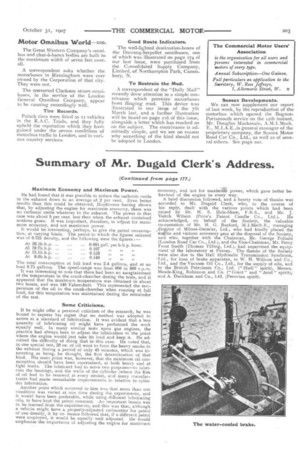Summary of Mr. Dugald Clerk's Address.
Page 9

If you've noticed an error in this article please click here to report it so we can fix it.
(Continued from page 177.) Maximum Economy and Maximum Power.
He had found that it was possible to reduce the carbonic oxide in the exhaust down to an average of 2 per cent. Even better results than this could be obtained, Hopkinson having shown that, by adjusting the engine for maximum economy, there was no carbonic oxide whatever in the exhaust. T he power in that case was about 5 per cent, less than when the exhaust contained noxious gases. It was important, therefore, to adjust for maximum economy, and not maximum power.
It would be interesting, perhaps, to give the petrol consumption, at varying loads. The petrol to which the figures referred was of 0.721 density, and the following were the figures :— The total consumption at full load was 2.4 gallons, and at no load 0.75 gallons. The speed-ranee was from 900 to 880 r.p.m. It was interesting to note that there had been an asceztainment of the temperature in the crank-chamber during the tests, and it appeared that the maximum temperature was obtained in about two hours, and was 140 Fahrenheit. This represented the temperature of the oil in the crank-chamber when running at full load, for this temperature was maintained during the remainder of the test.
Some Criticisms.
If he might offer a personal criticism of the research, he was bound to express his regret that no method was adopted to arrive at a standard of lubrication. It was evident that a less quantity of lubricating oil might have performed the work equally well. In many similar tests upon gas engines, the practice had always been to adjust the lubrication to the point where the engine would just take its load and keep it. He admitted the difficulty of doing that in this case. He noted that, in one special test, 28 oz. of oil went to fortn the heavy smoke in the exhaust during a period of only 45 minutes, which was interesting as being, he thought, the first determination of that kind. His main point was, however, that the minimum oil consumption should have been ascertained, at both heavy and at light loads. The lubricant had to serve two purposes—to lubricate the bearings, and the walls of the cylinder (where the film of oil had to be renewed at every stroke), and many manufacturers had made remarkable improvements in relation to cylinder lubrication.
Another point which occurred to him was that more than one condition was varied at one time during the experiments, and it would have been preferable, while using different lubricating oils to have kept the petrol constant. An important lesson was to be learned from the experiments, and this was that, although a vehicle might have a properly-aijusted carburetter for petrol of one density, it by no means followed that, if a different petrol were employed, it would be equally well adjusted. He would emphasise the importance of adjusting the engine for maximum
economy, and not for maximuit power, which gave better behaviour of the engine in every way.
A. brief discussion followed, and a hearty vote of thanks was accorded to Mr. Dugald Clerk, who, in the course of his reply, dealt with the various points which had been raised by Dr. H. S. Hele-Shaw, F.R.S., and Mr. J. Veitch Wilson (Price's Patent Candle Co., Ltd.). He acknowledged, on behalf of the Society, the valuable co-operation of Mr. H. G. Burford, M.I.Mech.E., managing director of Milnes-Daimler, Ltd., who had kindly placed the engine and various accessory gear at the disposal of the Society, and who, together with the Chairman, Mr. George Pollard (London Road Car Co., Ltd.), and the Vice-Chairman, Mr. Percy Frost Smith (Thomas Tilling, Ltd.), had supervised the equipment of the laboratory at Putney. The thanks of the Society were also due to the Hall Hydraulic Transmission Syndicate,. T.td., for loan of brake apparatus, to W. H. Willcox and Co., Ltd., and the Vacuum Oil Co., Ltd., for the supply of oils, and to the British Petroleum Co., Ltd. (" Shell" spirit), Messrs. Meade-King, Robinson and Co. (" Giant" and " Ariel" spirit); and A. Duckbam and Co., Ltd, (Peruvian spirit).
























